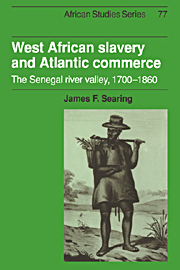Book contents
- Frontmatter
- Contents
- List of maps
- Preface
- Map 1 The Lower Senegal in the eighteenth century
- 1 Cosaan: “the origins”
- 2 Slavery and the slave trade in the Lower Senegal
- 3 The Atlantic kingdom: maritime commerce and social change
- 4 Merchants and slaves: slavery on Saint Louis and Gorée
- 5 Famine, civil war, and secession, 1750–1800
- 6 From river empire to colony: Saint Louis and Senegal, 1800–1860
- Conclusion
- Notes
- Index
- TITLES IN THE SERIES
1 - Cosaan: “the origins”
Published online by Cambridge University Press: 19 October 2009
- Frontmatter
- Contents
- List of maps
- Preface
- Map 1 The Lower Senegal in the eighteenth century
- 1 Cosaan: “the origins”
- 2 Slavery and the slave trade in the Lower Senegal
- 3 The Atlantic kingdom: maritime commerce and social change
- 4 Merchants and slaves: slavery on Saint Louis and Gorée
- 5 Famine, civil war, and secession, 1750–1800
- 6 From river empire to colony: Saint Louis and Senegal, 1800–1860
- Conclusion
- Notes
- Index
- TITLES IN THE SERIES
Summary
The period from 1700 to 1860 brought dramatic changes to the societies of the Lower Senegal. Much of the impetus for change resulted from the development of Atlantic commerce, driven forward by the demand for slaves in the Atlantic world and for the products they produced: sugar, tobacco, indigo, coffee, and rice. In Senegambia, one of the first regions of West Africa to export slaves across the Atlantic, the first half of the eighteenth century was the apogee of the slave trade. The development of the slave trade set in motion far-reaching changes in the economies and societies of the Lower Senegal, whose history forms the subject of this book. The changes that accompanied the development of Atlantic commerce can only be understood by placing them in the context of the region and its history. Two fundamental factors which shaped the history of the region were its ecology and the historical patterns of human settlement, both of which crystallized in their historical forms long before the arrival of the first merchants from the Atlantic world. Oral traditions, archaeological data, and early European documents permit an understanding of the most important trends in the centuries that preceded the Atlantic trade.
Ecology and history are inseparable in the Lower Senegal, where the historical patterns of settlement and the identity of communities reflect ecological systems and their use and management by human communities. Oral traditions describe the encounters of people with the land. The origin myths of Wolof, Sereer, and Lebu communities fix these communities in the landscape, often describing their arrival from earlier ancestral lands. But each people found a different niche in the ecology, which in turn influenced their historical identity.
- Type
- Chapter
- Information
- West African Slavery and Atlantic CommerceThe Senegal River Valley, 1700–1860, pp. 1 - 26Publisher: Cambridge University PressPrint publication year: 1993



